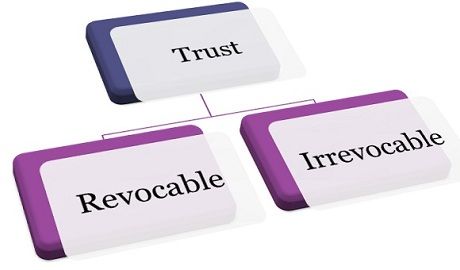
How to Tell if the Trust is Revocable or Irrevocable | Learn the Facts
The contents of this web page are for informational and educational purposes only, and nothing you read is intended to be legal advice. Please review our disclaimer before taking action based upon anything you read or see.
When it comes to estate planning, determining whether the trust is revocable or irrevocable is a key decision for the family situation. Both the devices are different in many ways, have different effects, and serve different aims and objectives.
A revocable trust and irrevocable are specific terms that explain the same thing. It is as any trust is an entire legal entity that a person sets up to run and manage his assets.
It creates this trust in the person’s life in a way in which he wants to manage it. So, let’s learn how to tell if the trust is revocable or irrevocable.
The alternative method to tell that trust is revocable and irrevocable is a better option to get help from the local attorney, as a professional will review the trust’s documents to get you out of the confusion.
Here are a few important differences; keeping in mind one can easily decide whether it is a revocable or irrevocable trust and which one is better for you.
Revocable Trust

A revocable trust works when an individual or granter signs a trust agreement by naming a person or corporation. Also from a company or any bank, a corporation both as trustee to administer the trust. A revocable trust typically provides that the property should receive management for the benefit of the granter.
Contrary to the irrevocable trust, the revocable trust the main objective is to avoid the probate process. Thus, the transfer of assets to the beneficiaries becomes simple and avoids the court’s probate process.
Irrevocable Trust

The term irrevocable trust directs to the kind of trust where you cannot alter its terms and conditions. Also, revision, amend, or remove this one without the authorization and approval of graters inheritor. The main purpose of the irrevocable trust is to remove certain assets from a granter’s taxable estate.
So, these incidents of ownership belong to a trust. A granter can choose this structure to relieve assets in the trust from tax liabilities and others.
How to tell if the Trust is Revocable or Irrevocable

There are several factors by which we can determine the status of the trust, whether revocable or irrevocable. Let’s have a look at a few of them.
Ownership of the property
When the assets have a setting in the irrevocable trust, the property will no longer own the granted. So, it now belongs to the trust. It does not mean that the individual can no longer live in the house or property they have lived in for about 30 years. Also if you can drive a car the trust owns. It just means that you are now not the trust owner.
Just like leasing a car or renting a house, you still own the assets for your future benefit. It is trust that has the authority to sell or the house or buy the other in which you can live. A property that has its settings, has an irrevocable trust. This allows implements settings to offer the best possible safety. Finally, protection of assets from the claims you made by creditors, as the assets altered the ownership.
This is hard from the revocable trust where the granters have complete ownership of the property.
Modification
You cannot alter, revoke, or cancel an irrevocable trust agreement. They can receive a court order. This leads to the protection of the assets. Moreover, the revocable trusts provide the mechanisms and instruments you can modify at the will of the granter if anyone likes to accept it.
Irrevocable trust generally refers to the terms and conditions of this trust that you cannot change under any conditions or circumstances. However, this does not always happen. There is a special power of the appointment in the irrevocable trust documents that may offer the granter the liberty to modify or change the nominated beneficiaries at his will without affecting the benefits of the irrevocable trust.
Estate taxes
In terms of estate taxes, within the irrevocable trust, the granter can no longer possess the property. Why? Because we cannot include this one in the calculations of the total value of assets or property at the time of overpassing the person.
But for the revocable trust, the granter still possesses the property. The evaluation of the trust’s property is part of the total value of the assets or possessions at the time of the owner’s death.
Protection of assets
The granter does not possess the assets in the irrevocable trust. They generally receive protection from the creditors or from the other claimants. The objective is to save or protect the property or assets from the claims of creditors, such as Medicaid or from the divorcing spouses.
So you can use this to avoid the restrictions and limitations of Medicaid that require an elder or adult person who want to go to the nursing home to spend most of his funds on Medicaid provisions. This benefit has a very important role in seeking the protection of assets from legal claims.
In contrast with the revocable trust, you cannot protect the assets and the property. The granter has full control and authority over the assets and is legally responsible for claims against the assets.
Medicaid planning
With an irrevocable trust, one of the important benefits during elderly planning is to allow the older granter to get the Medicaid advantages if he goes into the nursing home.
By setting the assets into the irrevocable trust in the actual needs for the coming five years, the granter can save the assets for the benefits of the nominated beneficiaries and heirs, as this is not the case in the revocable trust matters where the assets remain in possession of the granter has the full control over it.
Appointment of the trustee
In the irrevocable trust, the nominated trustee should be the independent person elected by the granter to perform the fiduciary duty to protect the family members and assets. The trustee does not offer this benefit. The trustee has to manage the assets of the trust and it has restrictions by the limitations and provisions.
If the trustee is appointed as the independent entity from the granter, it is clear that the trustee has independent control over the trust’s assets. But in the revocable trust, the granter also acts as a trustee and maintains the controls on the trust’s assets.
Income tax return
In the irrevocable trust, it has its identification and tax numbers. It can either pay the tax itself or issue K-1 to the granter or the beneficiaries. All this if the granter deceases for income that runs into the recipient. There is no such situation in the revocable trust, and the taxpayer can file on 1040 as if he owns the assets personally that have produced the income.
Frequently Asked Questions
Which is better revocable or irrevocable?
When it is a matter of protecting assets, an irrevocable trust is far better than a revocable trust. If the trust is revocable, a person who shaped the trust retains complete control and authority over all trust assets. This property is then truly sheltered by being in the irrevocable trust.
Why put your house in an irrevocable trust?
To protect your assets, placing them in an irrevocable trust terminates them from your estate. Unlike employing assets in a revocable trust, forming one will leave the house safe from creditors and the estate tax. If you use an irrevocable bypass trust to plan wisely for yourself or your spouse’s future post-death status, they’ll also be protected by this kind of arrangement.
What is the greatest advantage of an irrevocable trust?
Although the irrevocable trusts have different roles, the granter and the trustee are often the same persons. So one of the greatest advantages of irrevocable trust is that it can offer great protection and safety from future creditors and lawsuits as well as bad marriages.
What is the purpose of a revocable property?
A revocable trust is a trust document created by an idea that can be altered or changed with time. Revocable living trusts are created to avoid probate and save or protect the privacy of the trust owner and beneficiaries of the trust and reduce the estate taxes.
How does a revocable trust work?
A revocable trust is one where the provisions can be altered or canceled depending on the granter or the originator of the trust. During the life of the trust, income received is circulated to the granter, and only after the death is property transferred to the trust’s beneficiaries.
Conclusion
By analyzing the above major differences among the revocable and irrevocable trusts, it is obvious that the main aim of the irrevocable trust is to protect the assets of the estate or trust by preventing the property from being included in the evaluation of total assets of the deceased at the time of death.
The irrevocable trust also saves the assets within the trust from paying off taxes and the probate process. So, it protects the property and assets from the creditors because they do not own the assets.
You have gone through the two devices in detail when it comes to estate development. It is essential to hire the professional’s services to meet the granter’s needs and the trust’s goals. In these ways, you can tell it is a revocable or irrevocable trust.
References
- https://www.findlaw.com/state/california-law/revocable-living-trusts-in-california.html
- https://www.investopedia.com/terms/r/revocabletrust.asp
- https://www.americanbar.org/groups/real_property_trust_estate/resources/estate_planning/revocable_trusts/
- https://www.investopedia.com/articles/pf/06/revocablelivingtrust.asp
- https://www.fiduciarytrust.com/article-pages/trust-estate–tax-planning/the-benefits-and-shortcomings-of-revocable-trusts
- https://www.policygenius.com/trusts/what-is-trust-property/
- https://www.investopedia.com/terms/i/irrevocabletrust.asp
- https://www.investopedia.com/ask/answers/071615/what-difference-between-revocable-trust-and-living-trust.asp
- https://www.thebalance.com/overview-of-types-of-property-ownership-3505420
- https://www.boe.ca.gov/proptaxes/pdf/Ownership_DeedRecording.pdf
- https://www.stimmel-law.com/en/articles/joint-tenancy-co-ownership-property-advantages-and-disadvantages
- https://www.irs.gov/businesses/small-businesses-self-employed/estate-tax

I’m a driven and accomplished law graduate and post-graduate, passionate about sharing my legal expertise via my blog. I hold a Bachelor’s degree in Law from the University of London (UK) and a Master’s in Law from the University of Derby (UK). Both gave me the foundational knowledge and skills to excel in my chosen career path.
Throughout my academic journey, I have gained extensive knowledge in various fields of Law, including Corporate and Business Law in the USA, Criminal Law, International Law, US Copyright law, and most importantly, American Constitutional law.


Comments are closed.